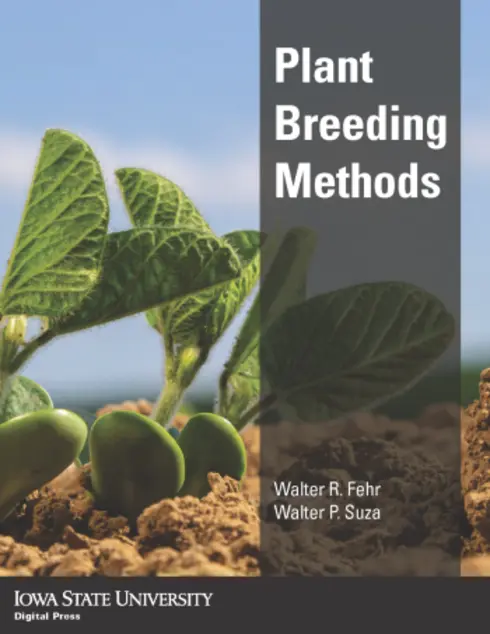
Plant Breeding Methods
![]()
![]()
![]()
![]()
![]()
Walter R. Fehr, Iowa State University
Walter P. Suza, Iowa State University
Copyright Year:
Publisher: Iowa State University Digital Press
Language: English
Formats Available
Conditions of Use
![]() Attribution-ShareAlike
Attribution-ShareAlike
CC BY-SA
Reviews
Reviewed by Ryan McCann, Registration and Graduation Assistant, St. Cloud Technical & Community College on 9/17/24
Yes, the book covers the overall process, expected information to learn and full index and reference to the content provided. read more
![]()
![]()
![]()
![]()
![]()
Reviewed by Ryan McCann, Registration and Graduation Assistant, St. Cloud Technical & Community College on 9/17/24
Comprehensiveness
Yes, the book covers the overall process, expected information to learn and full index and reference to the content provided.
Content Accuracy
The content is fully labelled and with detailed description. Each picture and word that would need referencing and furtherer detailed description has it. The picture even have multiple pictures in a string to show growth and transition if plants as they grow. Also, referenced are provided with links, full description and notation of original sources.
Relevance/Longevity
Yes, with references to the start of the breeding process back in the 90s to the current process used in the last decade. Referencing both to help show progress in the plant breeding methods developed over time.
Clarity
The content is full references and also key word index in the back. Online site even highlights words to allow better detail of the word with description. Examples have pictures and references to give better detail.
Consistency
The terminology and framework is consistent throughout the book. Referencing and references words and terms throughout the book. Giving additional detial through highlighted words and in the back of the book.
Even giving examples and quizzes throughout each chapter.
Modularity
Yes. They are very short reading and examples per chapter. Easily able to tackle a different part of the plant breeding process by providing step by step example and quizzes with each chapter provided.
Organization/Structure/Flow
The focus of each chapter is clear and stays within the focus of that chapter without wandering outside the chapter that would confuse the reader of future references and processes. If new words or examples are provided, each are given a keyword and additional details to lookup for clarification.
Interface
Yes, each link was able to locate the referenced page and each word highlighted had a clear concise description.
Grammatical Errors
Not that I saw on review. The book is well reviewed with no gramtical errors present.
Cultural Relevance
This book does not have a bias toward any certain group, political, sexual or otherwise. Purely based on plants and their biological processes.
CommentsN/A
Table of Contents
- Introduction
- Types of Cultivars and Modes of Plant Reproduction
- Sources of Parental Germplasm
- Population Formation by Hybridization
- Techniques for Artificial Hybridization
- Mutation Breeding
- Novel Traits from Molecular Genetics and Biotechnology
- Backcrossing
- Inbreeding
- Recurrent Selection
- Key Terms
- About the Authors
About the Book
This text has been compiled to provide an overview of how plant breeders develop cultivars of plant species. The methods that breeders use depend directly on the type of cultivar used to produce a commercial crop. The four most common types of cultivars are (a) clonal cultivars (b) synthetic cultivars (c) pure-line cultivars and (d) hybrid cultivars. These types of cultivars will be discussed throughout the book, alongside review questions for self-study.
About the Contributors
Authors
Walter R. Fehr is an emeritus Charles F. Curtiss Distinguished Professor of Agriculture and Life Sciences, the highest academic honor at Iowa State University (ISU). He obtained graduate degrees in plant breeding from the University of Minnesota and Iowa State University. From 1967 to 2018, he was a faculty member in the Department of Agronomy at ISU where he taught undergraduate and graduate plant breeding courses and conducted research specializing in soybean breeding and genetics. He served as the major professor for 92 students who obtained MS and PhD degrees and authored 270 articles in refereed scientific journals, three books, and 11 book chapters. As a soybean breeder, he developed more than 200 cultivars and was awarded 28 US patents for development of unique genetic traits related to soybean oil quality.
Walter P. Suza is the George Washington Carver Endowed Chair and Adjunct Associate Professor at Iowa State University. His research focuses on the metabolism and physiology of plant sterols. He teaches courses on Genetics and Crop Physiology in the Department of Agronomy. In addition to co-developing courses for the ISU Distance Master’s in Plant Breeding Program, Suza also served as the director of Plant Breeding e-Learning in Africa (PBEA) for eight years. With PBEA, Suza helped provide access to open educational resources on topics related to the genetic improvement of crops. Suza has worked in central and southern Africa, including at the World Food Programme, Angola, and the United Nations Children’s Fund, Zimbabwe, in the areas of food security assessment and mapping of vulnerable households, drought assessment, and coordination of food aid. He holds a Ph.D. in the plant sciences (with an emphasis in molecular physiology) from the University of Nebraska-Lincoln.
